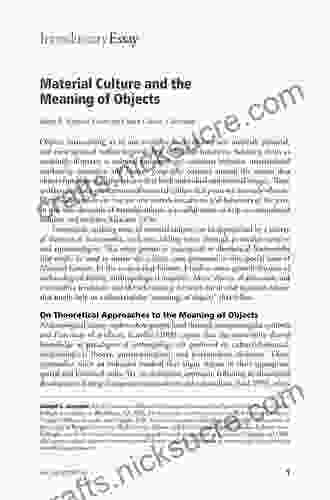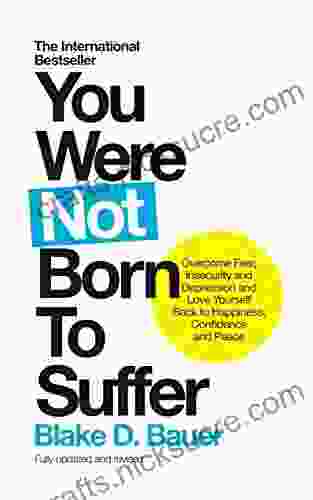Mindfulness-Based Cognitive Therapy for Depression (Second Edition): A Comprehensive Guide to Relief

4.7 out of 5
| Language | : | English |
| File size | : | 3724 KB |
| Text-to-Speech | : | Enabled |
| Screen Reader | : | Supported |
| Enhanced typesetting | : | Enabled |
| Word Wise | : | Enabled |
| Print length | : | 473 pages |
Are you struggling with depression, feeling overwhelmed by negative thoughts and emotions? Mindfulness-Based Cognitive Therapy (MBCT) offers a beacon of hope, guiding you towards a path of healing and recovery. This evidence-based therapeutic approach combines the ancient wisdom of mindfulness with the transformative insights of cognitive therapy to address the root causes of depression and equip you with lifelong coping mechanisms.
Understanding Depression
Depression is a complex mental health condition characterized by persistent sadness, loss of interest, and feelings of worthlessness. It can disrupt every aspect of life, affecting your relationships, work, and overall well-being. Traditional treatments often focus on symptom management through medication or talk therapy; however, MBCT takes a more holistic approach, aiming to change the way you relate to your thoughts and emotions.
The Principles of MBCT
MBCT is based on the following principles:
- Mindfulness: Cultivating present-moment awareness without judgment or reactivity.
- Cognitive Therapy: Identifying and challenging negative thought patterns that contribute to depression.
- Compassion: Treating yourself and others with kindness and understanding.
How MBCT Works
MBCT combines mindfulness practices with cognitive techniques in an eight-week program. Each session typically involves the following elements:
- Body Scan Meditation: Bringing awareness to physical sensations to enhance present-moment awareness.
- Breathing Space Meditation: Focusing on the breath to cultivate mindfulness and reduce stress.
- Thought Diary: Identifying and examining negative thought patterns.
- Cognitive Restructuring: Challenging negative thoughts and replacing them with more positive and realistic ones.
- Homework Assignments: Practicing mindfulness and cognitive techniques outside of sessions to reinforce learning.
Benefits of MBCT
Research has consistently shown the effectiveness of MBCT for depression. Benefits include:
- Reduced Depression Symptoms: Significant reductions in symptoms such as sadness, hopelessness, and loss of interest.
- Improved Mood and Well-Being: Increased feelings of positive emotions and overall life satisfaction.
- Enhanced Cognitive Function: Improved attention, concentration, and decision-making abilities.
- Increased Mindfulness Skills: Developed ability to stay present, acknowledge emotions without judgment, and respond with greater wisdom.
- Reduced Relapse Rates: Increased resilience to future depressive episodes and improved long-term outcomes.
Who Can Benefit from MBCT?
MBCT is suitable for individuals who:
- Have experienced multiple episodes of depression.
- Are currently experiencing mild to moderate depression.
- Are looking for a non-pharmacological approach to managing depression.
- Are willing to commit to an eight-week program and practice mindfulness regularly.
Getting Started with MBCT
If you're interested in exploring MBCT, consider the following steps:
- Find a Trained Therapist: Look for a mental health professional who is certified in MBCT.
- Enroll in a Program: Attend an eight-week MBCT course offered by a reputable organization.
- Practice Regularly: Dedicate time to daily mindfulness and cognitive exercises.
- Be Patient and Persistent: Learning MBCT takes time and effort, but the benefits are worth the investment.
Mindfulness-Based Cognitive Therapy for Depression (MBCT) is a transformative therapeutic approach that empowers you to manage depression, improve your well-being, and live a more fulfilling life. By embracing mindfulness, challenging negative thinking, and cultivating self-compassion, you can break the cycle of depression and unlock your inner resilience. If you're struggling with depression, MBCT offers a beacon of hope, guiding you towards a journey of healing and recovery.
Frequently Asked Questions
Q: Is MBCT effective for all types of depression?
A: MBCT is most effective for individuals who have experienced multiple episodes of depression or are currently experiencing mild to moderate depression. It may not be as effective for severe or chronic depression.
Q: Can I do MBCT on my own?
A: While there are self-help resources available, it's highly recommended to work with a trained therapist to fully benefit from MBCT. They can provide guidance, support, and tailored treatment plans to meet your specific needs.
Q: How long does MBCT take to show results?
A: Most individuals experience significant improvements within the eight-week program. However, the benefits of MBCT can continue to grow with ongoing practice and application in daily life.
4.7 out of 5
| Language | : | English |
| File size | : | 3724 KB |
| Text-to-Speech | : | Enabled |
| Screen Reader | : | Supported |
| Enhanced typesetting | : | Enabled |
| Word Wise | : | Enabled |
| Print length | : | 473 pages |
Do you want to contribute by writing guest posts on this blog?
Please contact us and send us a resume of previous articles that you have written.
 Fiction
Fiction Non Fiction
Non Fiction Romance
Romance Mystery
Mystery Thriller
Thriller SciFi
SciFi Fantasy
Fantasy Horror
Horror Biography
Biography Selfhelp
Selfhelp Business
Business History
History Classics
Classics Poetry
Poetry Childrens
Childrens Young Adult
Young Adult Educational
Educational Cooking
Cooking Travel
Travel Lifestyle
Lifestyle Spirituality
Spirituality Health
Health Fitness
Fitness Technology
Technology Science
Science Arts
Arts Crafts
Crafts DIY
DIY Gardening
Gardening Petcare
Petcare Elisabetta Viggiani
Elisabetta Viggiani Richelle Mead
Richelle Mead Michael L Bloomquist
Michael L Bloomquist John Taylor
John Taylor Randy Walker
Randy Walker Charles C Patrick
Charles C Patrick Abigail Melton
Abigail Melton Michael Crawley
Michael Crawley James Surowiecki
James Surowiecki Chiara Giuliani
Chiara Giuliani Maxine Levaren
Maxine Levaren Israel Finkelstein
Israel Finkelstein Stacy Eaton
Stacy Eaton Al Desetta
Al Desetta Adam Frank
Adam Frank Stephen Brennan
Stephen Brennan Betsy Miller
Betsy Miller Charles Thomas Jr
Charles Thomas Jr Sean Lewis
Sean Lewis Adam Koch
Adam Koch Claire Ahn
Claire Ahn Kate Rope
Kate Rope Mikki Daughtry
Mikki Daughtry Adam Freeman
Adam Freeman Gerald A Voorhees
Gerald A Voorhees Gloria Atanmo
Gloria Atanmo Aaron Oster
Aaron Oster Charles L Byrne
Charles L Byrne Al Baird
Al Baird Arthur Turrell
Arthur Turrell Paul Chiasson
Paul Chiasson Al Yellon
Al Yellon David Rensin
David Rensin Rory Miller
Rory Miller Aaron Mahnke
Aaron Mahnke Scott Parsons
Scott Parsons Scott Carney
Scott Carney Paula Deen
Paula Deen Emily K Neuburger
Emily K Neuburger Chris Worfolk
Chris Worfolk Collins Kids
Collins Kids Gayle Forman
Gayle Forman Adam Boduch
Adam Boduch Lee Sandlin
Lee Sandlin Lisa Pineda
Lisa Pineda Craig Timberg
Craig Timberg Abhishek V R
Abhishek V R Laura Gao
Laura Gao Tim Larkin
Tim Larkin Pearson Education
Pearson Education Jennifer Greene
Jennifer Greene Steven Alan Childress
Steven Alan Childress Lois G Schwoerer
Lois G Schwoerer Catherine Ryan Hyde
Catherine Ryan Hyde Michelle Hodkin
Michelle Hodkin Todd Graves
Todd Graves Abby Sunderland
Abby Sunderland Zoe Hamlet Silva
Zoe Hamlet Silva Tim Jarvis
Tim Jarvis Phil Boyle
Phil Boyle Emily Suzanne Clark
Emily Suzanne Clark Teresa Finney
Teresa Finney Brian L Gorman
Brian L Gorman Og Mandino
Og Mandino Laura Ray
Laura Ray Leigh Bardugo
Leigh Bardugo Jack Cavanaugh
Jack Cavanaugh Annie Nicholas
Annie Nicholas Jennifer L Hunt
Jennifer L Hunt Farah Shabazz Ii
Farah Shabazz Ii Uri Bram
Uri Bram Laura Sebastian
Laura Sebastian Tom Migdalski
Tom Migdalski Garo Yepremian
Garo Yepremian Carley Roney
Carley Roney Aaron Reed Msn Crna
Aaron Reed Msn Crna Walter Browder
Walter Browder Alifya And Umesh Mohite
Alifya And Umesh Mohite Ariana Eagleton
Ariana Eagleton Chris Jericho
Chris Jericho Ian Mcleod
Ian Mcleod Stephen Gray
Stephen Gray Andy Couturier
Andy Couturier Matt Owens
Matt Owens Jeremy Miles
Jeremy Miles Cassandra Eason
Cassandra Eason Aaron Lee Johnson
Aaron Lee Johnson Aaron Reed
Aaron Reed Robert Reid
Robert Reid Ian Davis
Ian Davis Maya Lang
Maya Lang Jeremy Paxman
Jeremy Paxman Scott Butler
Scott Butler David G Brown
David G Brown Peter Harrison
Peter Harrison Ned Johnson
Ned Johnson Rosie Pope
Rosie Pope Christopher S Stewart
Christopher S Stewart Bathroom Readers Institute
Bathroom Readers Institute Michael Johnson
Michael Johnson Adam Galinsky
Adam Galinsky Marie Cirano
Marie Cirano Richard Martin
Richard Martin Sharon Boyd
Sharon Boyd William Hamilton Gibson
William Hamilton Gibson John Hancock
John Hancock Ron Hotchkiss
Ron Hotchkiss Laura Peyton Roberts
Laura Peyton Roberts Abigail Alling
Abigail Alling Aiden Thomas
Aiden Thomas Anthony Wilkenson
Anthony Wilkenson Virginia Smith Harvey
Virginia Smith Harvey Richard Langer
Richard Langer Gladys Chepkirui Ngetich
Gladys Chepkirui Ngetich Aliza Green
Aliza Green Ken Retallic
Ken Retallic Axie Oh
Axie Oh Jane Gross
Jane Gross Joe Simpson
Joe Simpson Adam Lazarus
Adam Lazarus Adam H Balen
Adam H Balen Jimmy Houston
Jimmy Houston Jim Morekis
Jim Morekis Richard Lighthouse
Richard Lighthouse Heather Lynn
Heather Lynn Allan Sand
Allan Sand Rob Gray
Rob Gray Peter David
Peter David Thubten Yeshe
Thubten Yeshe Michelle Obama
Michelle Obama Marc Dando
Marc Dando Cornel West
Cornel West Kristin Berry
Kristin Berry Emma Crewe
Emma Crewe Abigail Owen
Abigail Owen Randall Hyde
Randall Hyde Sheri Van Dijk
Sheri Van Dijk Carolyn Jessop
Carolyn Jessop Kayla Cottingham
Kayla Cottingham Mary Roach
Mary Roach Tom Mccarthy
Tom Mccarthy P S Page
P S Page Sheila Lamb
Sheila Lamb Gisle Solhaug
Gisle Solhaug Abbi Glines
Abbi Glines Amber Domoradzki
Amber Domoradzki Ron Jones
Ron Jones Kenn Kaufman
Kenn Kaufman Stephen R Lawhead
Stephen R Lawhead Casey Robson
Casey Robson Louise Pickford
Louise Pickford Marvin Valerie Georgia
Marvin Valerie Georgia Drew Harris
Drew Harris Michael N Mitchell
Michael N Mitchell Achille Rubini
Achille Rubini Clara Shaper
Clara Shaper Lisa M Schab
Lisa M Schab Miriam Forman Brunell
Miriam Forman Brunell Sarah K L Wilson
Sarah K L Wilson Baba Ifa Karade
Baba Ifa Karade Beth Newell
Beth Newell Sophie Mccartney
Sophie Mccartney Ben Cohen
Ben Cohen Laurence Steinberg
Laurence Steinberg Glen Finland
Glen Finland Reinette Biggs
Reinette Biggs Tamora Pierce
Tamora Pierce Moon Ho Jung
Moon Ho Jung Tony Soper
Tony Soper Steve Rosenberg
Steve Rosenberg Steve Mcmenamin
Steve Mcmenamin Lenyfer Garrido
Lenyfer Garrido Steve Roper
Steve Roper David Warriner
David Warriner Lindsey Ellison
Lindsey Ellison Claire Santry
Claire Santry Chashiree M
Chashiree M Elena Aguilar
Elena Aguilar Barbara Fox
Barbara Fox Stefan Ball
Stefan Ball Abigail Marshall
Abigail Marshall Paul Schneider
Paul Schneider Deborah Madison
Deborah Madison Mark Januszewski
Mark Januszewski Susan Walton
Susan Walton Daniel Carter Beard
Daniel Carter Beard Charlie Barker
Charlie Barker Megan Lane
Megan Lane Kim Gosselin
Kim Gosselin Gil Capps
Gil Capps Bobby Reyes
Bobby Reyes Eduardo Duran
Eduardo Duran Seth Kugel
Seth Kugel Kel Carpenter
Kel Carpenter Agustin Fuentes
Agustin Fuentes Rose Ann Hudson
Rose Ann Hudson Dr Robert Pasahow
Dr Robert Pasahow Kirk Bailey
Kirk Bailey Tomos Forrest
Tomos Forrest Meg Keys
Meg Keys Jason Korol
Jason Korol George J Hademenos
George J Hademenos Adam Braus
Adam Braus Sarah Luddington
Sarah Luddington Monica Sorrenson
Monica Sorrenson Ada Calhoun
Ada Calhoun Arthur Atchabahian
Arthur Atchabahian Ilsa J Bick
Ilsa J Bick Gregor Clark
Gregor Clark Marlene Wagman Geller
Marlene Wagman Geller Phong Thong Dang
Phong Thong Dang Larry Carpenter
Larry Carpenter Amelia Whitmore
Amelia Whitmore Ronald Kaine
Ronald Kaine William Deresiewicz
William Deresiewicz Carl Jones
Carl Jones Programming Languages Academy
Programming Languages Academy Adam Benshea
Adam Benshea Jennifer Finney Boylan
Jennifer Finney Boylan Terry Palechuk
Terry Palechuk Curt Lader
Curt Lader Gail Buckland
Gail Buckland T L Lowery
T L Lowery Barbara A Lewis
Barbara A Lewis James Heberd
James Heberd Horace Kephart
Horace Kephart Erika Fatland
Erika Fatland Charles Fernyhough
Charles Fernyhough Roman Dial
Roman Dial Abby Haight
Abby Haight Adam Lashinsky
Adam Lashinsky Sam Jarman
Sam Jarman Renda Dionne Madrigal
Renda Dionne Madrigal Andy Dumas
Andy Dumas Jack Moore
Jack Moore Jessie Hartland
Jessie Hartland Matt Warshaw
Matt Warshaw Abigail Hing Wen
Abigail Hing Wen Lucy Letcher
Lucy Letcher Jon Butterworth
Jon Butterworth Stephen Abbott
Stephen Abbott Vince Kotchian
Vince Kotchian David Lipsky
David Lipsky Zoyla Arana
Zoyla Arana Abbey Curran
Abbey Curran Gary Sakuma
Gary Sakuma Christina Hoff Sommers
Christina Hoff Sommers Al Barkow
Al Barkow David Feddes
David Feddes Charles H Kraft
Charles H Kraft Asato Asato
Asato Asato Amby Burfoot
Amby Burfoot Katrina Kahler
Katrina Kahler Martha Gellhorn
Martha Gellhorn Emily J Taylor
Emily J Taylor Cosmas Inyang
Cosmas Inyang Deborah Beck Busis
Deborah Beck Busis Genius Reads
Genius Reads Man Kam Lo
Man Kam Lo Michael Gruenbaum
Michael Gruenbaum Sarah Moore
Sarah Moore Rachel Caine
Rachel Caine Lillian Cumic
Lillian Cumic Randi Hutter Epstein
Randi Hutter Epstein Alvin Alexander
Alvin Alexander Alexander Nehamas
Alexander Nehamas Bill Mckibben
Bill Mckibben Martha C Nussbaum
Martha C Nussbaum Joy Neighbors
Joy Neighbors Eze Ugbor
Eze Ugbor Dan Werb
Dan Werb Linford Stutzman
Linford Stutzman Vikas Kakwani
Vikas Kakwani John D Gordon
John D Gordon Lisa Heffernan
Lisa Heffernan Lisa M Given
Lisa M Given Lisa Latimer
Lisa Latimer Abigail Hair
Abigail Hair Adam Enaz
Adam Enaz Achusim Michael
Achusim Michael Winifred Conkling
Winifred Conkling Abby Hafer
Abby Hafer Jeff Bauman
Jeff Bauman Debbie Ford
Debbie Ford Sheldon Axler
Sheldon Axler Jacob Neumann
Jacob Neumann Sasha Abramsky
Sasha Abramsky Bruce Van Brunt
Bruce Van Brunt Sally Clarkson
Sally Clarkson Garrett Mcnamara
Garrett Mcnamara Dick Edie
Dick Edie Dmv Test Bank
Dmv Test Bank Sherri Granato
Sherri Granato Alicia C Simpson
Alicia C Simpson Lynn Rush
Lynn Rush Sam J Miller
Sam J Miller Stephanie Zeiss
Stephanie Zeiss Adam Kimelman
Adam Kimelman Abinash Das
Abinash Das Miranda Kenneally
Miranda Kenneally Abdelkader Nouiri
Abdelkader Nouiri Adam J Rosh
Adam J Rosh Amber Fox
Amber Fox Barry Dainton
Barry Dainton Brigitte Jordan
Brigitte Jordan Andrew Skurka
Andrew Skurka Abigail Tucker
Abigail Tucker Edward J Larson
Edward J Larson Scott Shaw
Scott Shaw Kathy Koch Phd
Kathy Koch Phd Justin Driver
Justin Driver Rex Ogle
Rex Ogle Tom Rosenbauer
Tom Rosenbauer John Kean
John Kean Christophe Jaffrelot
Christophe Jaffrelot Kaylynn Flanders
Kaylynn Flanders Rolf Mowatt Larssen
Rolf Mowatt Larssen Timothy Phelps
Timothy Phelps Ann Frederick
Ann Frederick Goodman Publishing
Goodman Publishing Judi Kesselman Turkel
Judi Kesselman Turkel Christopher Pike
Christopher Pike Lavinia Collins
Lavinia Collins Michael Baigent
Michael Baigent Colin Hunter
Colin Hunter Ken Springer
Ken Springer Jim Willis
Jim Willis Domenica Marchetti
Domenica Marchetti Kemi Iwalesin
Kemi Iwalesin Aaron Blight
Aaron Blight Lucio Russo
Lucio Russo Abraham Silberschatz
Abraham Silberschatz Laurie Chaikind Mcnulty Lcsw C
Laurie Chaikind Mcnulty Lcsw C Taylan Hoca
Taylan Hoca Winston Chang
Winston Chang Xiuhtezcatl Martinez
Xiuhtezcatl Martinez Nick Holt
Nick Holt Papus
Papus Norton Juster
Norton Juster John Caig
John Caig Jenny Han
Jenny Han Aaron Mccargo
Aaron Mccargo An American Citizen
An American Citizen George John Romanes
George John Romanes Stuart Firestein
Stuart Firestein Katie Lear
Katie Lear Robert Fritz
Robert Fritz Tali Edut
Tali Edut Aaron James
Aaron James Conrad Bauer
Conrad Bauer Fred Fields
Fred Fields Eugene H Merrill
Eugene H Merrill Lynn Alley
Lynn Alley Liza Angela
Liza Angela Mark Strom
Mark Strom Barbara Natterson Horowitz
Barbara Natterson Horowitz Stephanie Puglisi
Stephanie Puglisi Rick Sekuloski
Rick Sekuloski Shuai Huang
Shuai Huang Mary Wong
Mary Wong Hans C Ohanian
Hans C Ohanian Nancy Mohrbacher
Nancy Mohrbacher Susan Zeppieri
Susan Zeppieri Barbara Decker
Barbara Decker Aaron Graves
Aaron Graves Brian Greene
Brian Greene Brad Brewer
Brad Brewer Pamela Druckerman
Pamela Druckerman Carmen Moreno
Carmen Moreno Abdul Foster
Abdul Foster David Simon
David Simon R L Stine
R L Stine Lisa Robertson
Lisa Robertson Jessica Hepburn
Jessica Hepburn E P Marcellin
E P Marcellin Scott Meyers
Scott Meyers Jay Ruud
Jay Ruud M J Parisian
M J Parisian Kevin A Morrison
Kevin A Morrison Peter Sagal
Peter Sagal Christian Beamish
Christian Beamish Abbas Kazerooni
Abbas Kazerooni Adam Becker
Adam Becker Achim K Krull
Achim K Krull Michel Roy
Michel Roy Aaron J Perry
Aaron J Perry Iain Highfield
Iain Highfield Sorin Dumitrascu
Sorin Dumitrascu Hillary Allen
Hillary Allen Abu Mussab Wajdi Akkari
Abu Mussab Wajdi Akkari Felice Fox
Felice Fox Brian Hoggard
Brian Hoggard Pat Chargot
Pat Chargot Ralph Villiger
Ralph Villiger Andrew Campanella
Andrew Campanella Jasna Tuta
Jasna Tuta Christopher Monahan
Christopher Monahan Andrea M Nelson Royes
Andrea M Nelson Royes Abigail Pogrebin
Abigail Pogrebin Dawson Church
Dawson Church Maureen Duffin Ward
Maureen Duffin Ward Steve Griffith
Steve Griffith Neil Oliver
Neil Oliver Harley Rustad
Harley Rustad Abby Mcallister
Abby Mcallister Phil Gaimon
Phil Gaimon Robert Allans
Robert Allans Dan Shideler
Dan Shideler Christopher Black
Christopher Black Carl Vernon
Carl Vernon Blake D Bauer
Blake D Bauer Jeremy Roenick
Jeremy Roenick Jennifer Shannon
Jennifer Shannon T L Christianson
T L Christianson Chaz Scoggins
Chaz Scoggins Linda Sarris
Linda Sarris Ryan Smithson
Ryan Smithson Benjamin Roberts
Benjamin Roberts Louise Thaden
Louise Thaden Helen C Rountree
Helen C Rountree Daphne Poltz
Daphne Poltz Paul Mclerran
Paul Mclerran Chuck Callaway
Chuck Callaway Wayne Westcott
Wayne Westcott Sarah Maslin Nir
Sarah Maslin Nir Kit Bauman
Kit Bauman Jennifer Ackerman
Jennifer Ackerman Adam D Scott
Adam D Scott Helen Scales
Helen Scales Lin Wellford
Lin Wellford Gavin D J Harper
Gavin D J Harper Vivian Gussin Paley
Vivian Gussin Paley Irene Lewis Mccormick
Irene Lewis Mccormick Michael Egan
Michael Egan Adam Chandler
Adam Chandler Melodie M Davis
Melodie M Davis Tomi Adeyemi
Tomi Adeyemi Suzanne Corkin
Suzanne Corkin Adam J Cox
Adam J Cox Rania Abouzeid
Rania Abouzeid Gerry Donohue
Gerry Donohue Alan Robertson
Alan Robertson G Bailey
G Bailey J Robert King
J Robert King Alicia Silverstone
Alicia Silverstone Douglas W Hubbard
Douglas W Hubbard Fumio Sasaki
Fumio Sasaki Abridged Ed Edition Kindle Edition
Abridged Ed Edition Kindle Edition Barry Robinson
Barry Robinson Rachael Ray
Rachael Ray Corinne Andrews
Corinne Andrews O Thomas Gift
O Thomas Gift Darrin Bergman
Darrin Bergman Shannon Hale
Shannon Hale Debbie Elicksen
Debbie Elicksen David Winner
David Winner Caroline Kaufman
Caroline Kaufman Tom Jackson
Tom Jackson Shari Eskenas
Shari Eskenas Devika Primic
Devika Primic Achref Hassini
Achref Hassini Vivienne Sanders
Vivienne Sanders Sean Mcmanus
Sean Mcmanus Sissy Goff
Sissy Goff Erik Scott De Bie
Erik Scott De Bie Stephen A Mitchell
Stephen A Mitchell Richard Sattora
Richard Sattora Thomas Wilson
Thomas Wilson Jay Dawes
Jay Dawes Chella Quint
Chella Quint Ed Engle
Ed Engle Brandon Neice
Brandon Neice Natasha Preston
Natasha Preston Christopher Knight
Christopher Knight Lynn E Ponton
Lynn E Ponton Ann Mariah Cook
Ann Mariah Cook Bill Loguidice
Bill Loguidice Irakli Makharadze
Irakli Makharadze Dan Morris
Dan Morris Aaron Hahn
Aaron Hahn Jeremy Shinewald
Jeremy Shinewald
Light bulbAdvertise smarter! Our strategic ad space ensures maximum exposure. Reserve your spot today!

 Julio CortázarNext Stop: An Autistic Son Grows Up - A Journey of Acceptance, Love, and...
Julio CortázarNext Stop: An Autistic Son Grows Up - A Journey of Acceptance, Love, and... Will WardFollow ·14.8k
Will WardFollow ·14.8k Tom HayesFollow ·8.8k
Tom HayesFollow ·8.8k Eugene PowellFollow ·5.4k
Eugene PowellFollow ·5.4k Jacob HayesFollow ·7.1k
Jacob HayesFollow ·7.1k Henry HayesFollow ·18.6k
Henry HayesFollow ·18.6k Tyler NelsonFollow ·13.9k
Tyler NelsonFollow ·13.9k Ivan TurnerFollow ·6.2k
Ivan TurnerFollow ·6.2k Cormac McCarthyFollow ·12.6k
Cormac McCarthyFollow ·12.6k

 Doug Price
Doug PriceTracing the Evolution of Modern Psychoanalytic Thought:...
Psychoanalysis, once considered a radical...

 Devin Ross
Devin RossThe Digital Role Playing Game Approaches To Digital Game...
These are just a few of the many...

 F. Scott Fitzgerald
F. Scott FitzgeraldHistory from Things: Essays on Material Culture
History from Things:...

 Percy Bysshe Shelley
Percy Bysshe ShelleyThe Priest Lake Girl and the Cabin of Love: A True Story...
The Murder On...

 Isaiah Powell
Isaiah PowellThe Golf Mystic: Dick Edie's Unconventional Approach to...
In the annals of golf history, the name Dick...
4.7 out of 5
| Language | : | English |
| File size | : | 3724 KB |
| Text-to-Speech | : | Enabled |
| Screen Reader | : | Supported |
| Enhanced typesetting | : | Enabled |
| Word Wise | : | Enabled |
| Print length | : | 473 pages |












